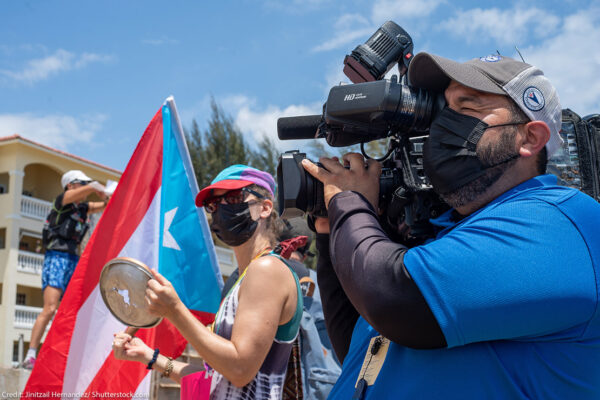Appeals Court Unanimously Affirms Right to Videotape Police
Simon Glik Broke No Law When He Used His Cell Phone to Record Police Officers' Use of Force Against Another Man on Boston Common
FOR IMMEDIATE RELEASE
CONTACT: (212) 549-2666; media@aclu.org
BOSTON -- The U.S. Court of Appeals for the First Circuit ruled unanimously late Friday that Simon Glik had a right to videotape police in action on Boston Common. Mr. Glik sued three police officers and the City of Boston for violating his civil rights after police arrested him and charged him with illegal wiretapping, aiding the escape of a prisoner, and disturbing the peace--all for merely holding up his cell phone and openly recording Boston police officers who were punching another man on Boston Common in October 2007. As a defense, the police argued the law was not clear, but the Court decisively rejected their claim of immunity from being sued.
"This is a resounding victory for the First Amendment right to openly record police officers carrying out their duties in a public place," said Sarah Wunsch, ACLU of Massachusetts staff attorney. "It will be influential around the country in other cases where people have been arrested for videotaping the conduct of the police," said Wunsch.
"Police officers must be trained to respect the right of people to openly record their actions in public," said David Milton, a Boston attorney representing Mr. Glik for the ACLU in the civil rights suit. "Simon did what we hope any engaged citizen would do, which was documenting what he thought looked like an improper use of force, and his action in no way interfered with the police."
"This case is significant not only for members of the public who use cell phone cameras to document police conduct. It is equally important for members of the media, since reporters and the public have the same right of access to information," said attorney Milton. The court noted that changes in technology have made it hard to draw a line between a private citizen and a journalist. This ruling applies to recording of all public officials. The Court noted the particular importance of recording police officers because they have "substantial discretion that may be misused to deprive individuals of their liberties."
Massachusetts wiretap statute (Ch. 272, Sec. 99) prohibits willful interception--in secret--of any oral communication, without having obtained the prior authorization of those taking part. However, the statute does not require "consent," it only requires that the recording not be secret. Since Mr. Glik was openly recording the police by holding up his cell phone, there was no reason to believe he was violating the statute. The police therefore also violated Glik's Fourth Amendment right to not be arrested without probable cause, as well as his First Amendment right to observe and gather information about what the police were doing in a public place.
At the time of his arrest, Simon Glik was a lawyer who had finished a clerkship with the Probate Court. He was looking for a permanent job as an attorney. Instead, for four months, he became a criminal defendant facing a felony charge.
During the incident, Mr. Glik stood about ten feet away from the officers while they were making an arrest. He did not interfere. Mr. Glik did not speak to the police officers nor did they speak to him until the suspect was in handcuffs. The police officers were identified later as John Cunniffe, Peter J. Savalis, and Jerome Hall-Brewster. They are defendants in the civil rights case along with the City of Boston, which the suit argues is responsible for inadequately training, supervising, and disciplining officers who arrest people under the wiretap statute for openly recording the police carrying out their duties in public.
Shortly after Mr. Glik's arrest, the Suffolk County District Attorney's office dropped the "aiding the escape of a prisoner" charge but pursued the wiretap charge (a felony) and disturbing the peace. After a judge of the Boston Municipal Court threw out those charges, the ACLU of Massachusetts brought a civil rights suit on Mr. Glik's behalf, charging that the police officers and the City had violated his rights.
All of the police officers asked the U.S. District Court to throw out the case against them on the grounds of "qualified immunity", which protects government officials from the burdens of a lawsuit only if the allegations of the complaint do not show a constitutional violation, or, if they do constitute a violation of a constitutional right, the right was not clearly established, and a reasonable police officer would not have known about it.
In June 2010, U.S. District Court Judge William Young denied the police officers' request to have the case against them dismissed, stating that the law is clearly established that the First Amendment protects Simon Glik's conduct, and refused to grant them qualified immunity from suit.
The police officers appealed that ruling to the U.S. Court of Appeals, which heard oral arguments on June 8, 2011. The claims against the City of Boston for failing to train and supervise police officers about the right of Americans to observe and openly record the conduct of the police in public is not subject to qualified immunity and have continued in U.S. District Court.
David Milton of the Boston firm Law Offices of Howard Friedman is the cooperating attorney for the ACLU of Massachusetts and argued for Simon Glik, asking the First Circuit to affirm Judge Young's ruling. He, his colleague Howard Friedman, and ACLU of Massachusetts staff attorney Sarah Wunsch have been representing Mr. Glik on the civil rights lawsuit.
For more details, including video of the arrest witnessed by Mr. Glik, see:
http://aclum.org/glik


